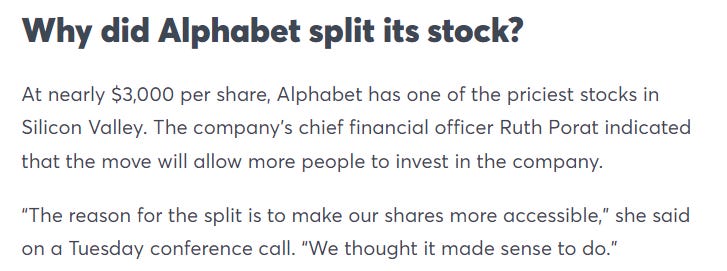📈Splitting Headache
As financial “professionals,” some things that may seem inconsequential to most people can trigger us. And today my friends, we are triggered.
Alphabet, the parent company of Google, announced a 20 to 1 stock split. A stock split is when a company increases the number of shares and lowers the price of their stock to improve liquidity and lower the per share cost of their company.
Just to be clear, this does not mean that you suddenly 20x your investment. In the case of Google, if you owned 1 share before the split, you would own 20 shares afterwards at 1/20th the original price.
1 share x $3000 = $3000 investment in Google
20 shares x ($3000/20) = $3000 investment in Google
Meaning a stock split does nothing to your investment and shouldn’t affect the performance of the stock really at all. Then why are we so triggered?
We are triggered because the financial media - aka, CNBC - act like this is some big deal. Even writing articles about how it will affect the performance of the stock. Below is an excerpt from the article.
This is the oft-trotted out reasoning for stock splits and why they should improve stock performance following the split. This might have made sense years ago. Now, it fails to hold much water. Not only do we have ETFs and mutual funds which allow you to buy fractions of multiple companies at once. But numerous brokerage firms now allow you to simply buy fractional shares of individual companies.
That means even before the stock split if you couldn't afford $3000 to buy a share of Google, you could pay $300 to buy 0.1 share, or even $30 to buy 0.01 shares at any of the brokers listed above.
Despite the fact that it changes nothing, the media likely covers it for a couple of reasons. The first being stock splits only occur with companies that are growing rapidly, which usually means they are some of the largest, most successful companies. To that point, Apple, Nvidia, and Tesla have also executed stock splits since 2020. Secondly, they are covered because stocks have traditionally performed well following a stock split as shown here.
Howeva… the reason for this is not because a stock split magically makes a company perform better. Companies that split their stock are high performing before the split and the split itself simply gives them more publicity and signals they are confident in the future growth of the company. So feel free to buy a stock that is getting split, just don't buy only because of the split.
What’s the Upside?
Stock splits are overhyped by financial media but change nothing about the company or your personal investment. Feel free to buy these companies just never buy into the hype and narratives that a stock split is a meaningful event.
To summarize:
For Your Weekend
Our round-up of essays, podcasts, and streaming shows to check out over your weekend. We cast a wide net so you don’t have to.
Read:
I Can’t Stop Thinking About This by Kyle Chayka (The New Yorker)
Here is a partial list of things that people on Twitter “can’t stop thinking about” in the span of three hours on a recent afternoon: the latest episode of the HBO show “Euphoria,” “Euphoria” ’s soundtrack, the film “Drive My Car,” the plot of the 1997 film “Beat,” the Netflix show “Maid,” getting a whale tattoo behind one ear, the new Kid Rock song, an online reviewer of L. L. Bean clothing describing their body as “my architecture,” making taco soup for dinner, eating lasagna despite never having eaten it before, scallion cream cheese, a beatific photo of the Formula 1 racing driver Mick Schumacher, the word “ocean,” death, a summary of the TV show “Raised by Wolves,” and even, reflexively, endeavoring to “become the version of yourself” that you can’t stop thinking about.
This constant refrain is, in a way, the coyote howl of social media. It is used to point to something that the utterer is concerned or excited by. The more vehement the exclamation, the more intense the feeling inspired by its object. The call operates collectively, and it can have a cascading effect. If one person shouts that she can’t stop thinking about something, the natural response is not to join in her particular obsession but to yelp that you, too, have something that you are obsessed with. An unspoken competition takes place to see who can profess their passion of the moment in the most attention-grabbing way. The result is an incomprehensible chorus of yowling.
Trade Deadline Takeaways: Harden’s Fit in Philly, Another Perplexing Porzingis Trade, and More by The Ringer Staff (The Ringer)
The 2022 trade deadline has come and gone, with virtually every team in the NBA swinging at least one deal before the final buzzer. Our staff takes a step back and looks at the biggest takeaways from the past week-plus of moves.
Watch:
Nightmare Alley (HBO Max)
Guillermo del Toro’s remake of the 1947 film by the same name is sumptuous to look at, even if the pace drags at times. The story follows Stan (Bradley Cooper), a man of questionable morals who stumbles into the means of achieving the fame and fortune he desires - but at what cost?
It’s a fine film that’s worth a watch, particularly once it finds its footing in the second act and third acts. Just power through the first 45 mins (the original clocked in at a brisk 111 minutes; GDT’s version is 140 mins and can feel longer in spots).












